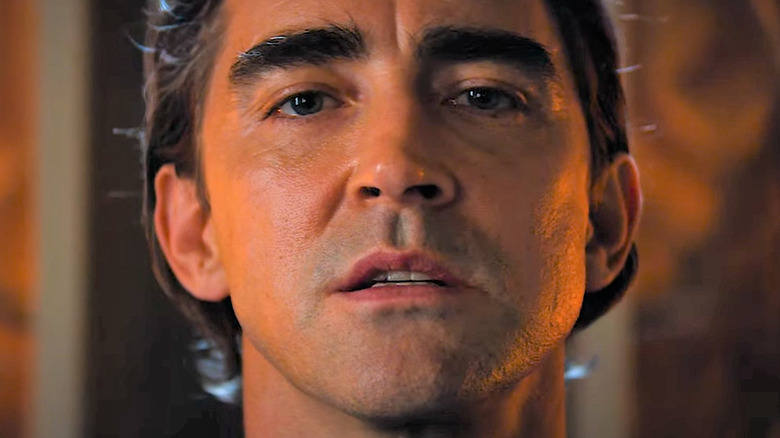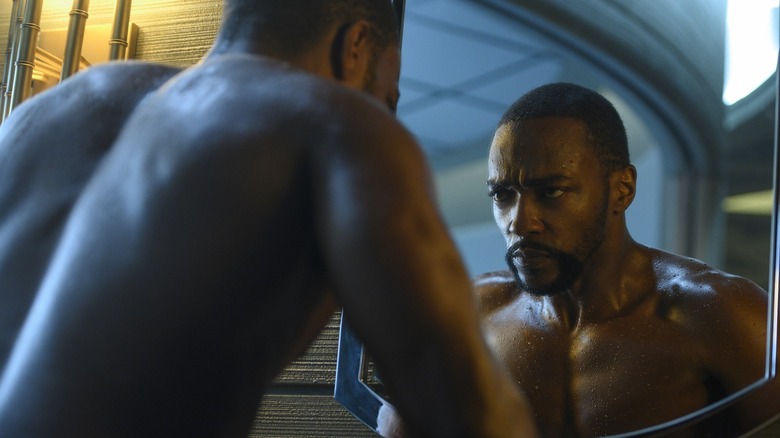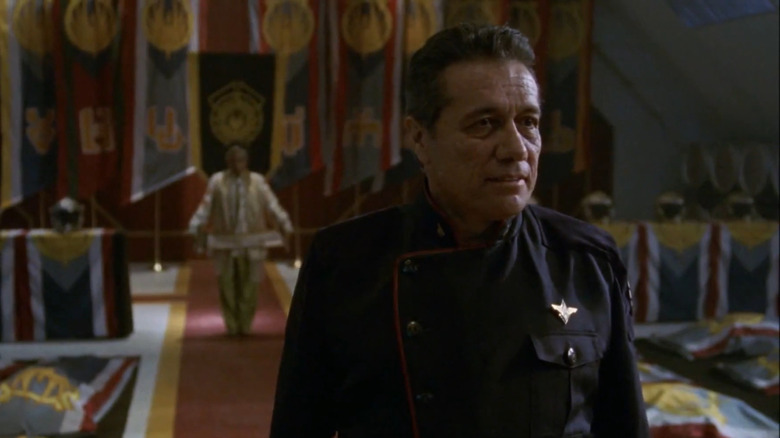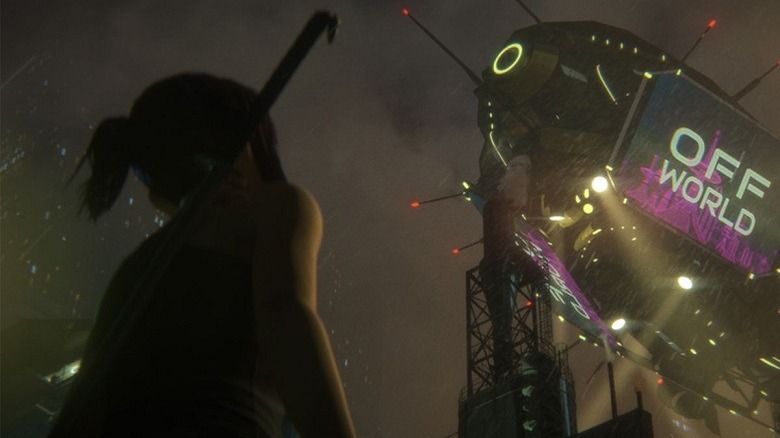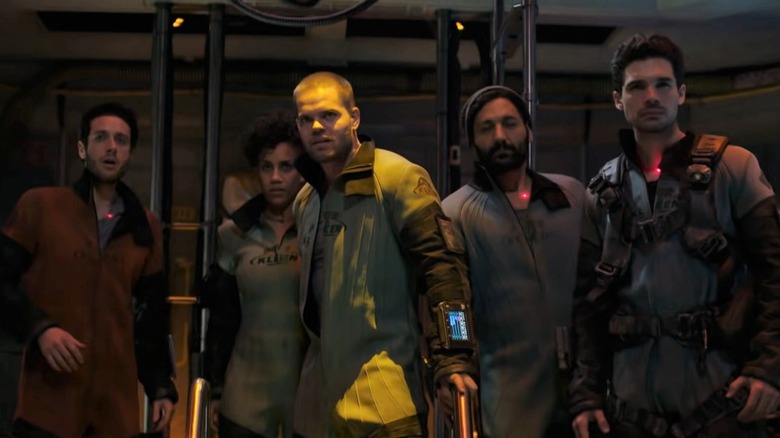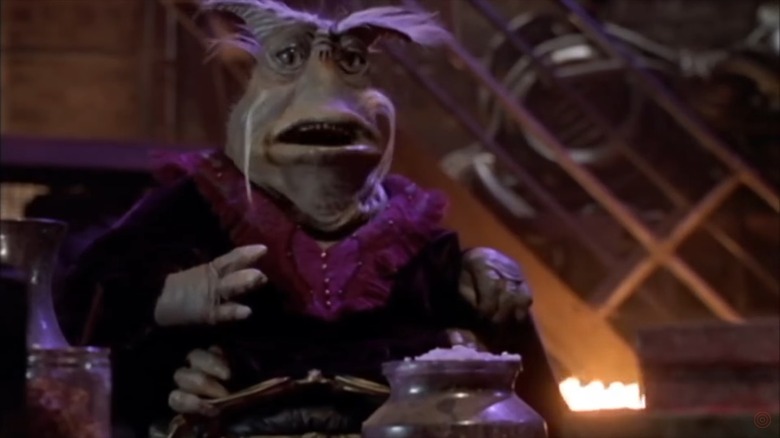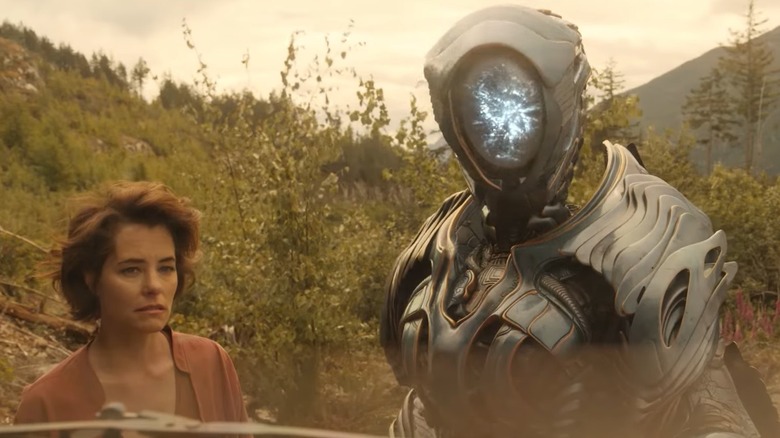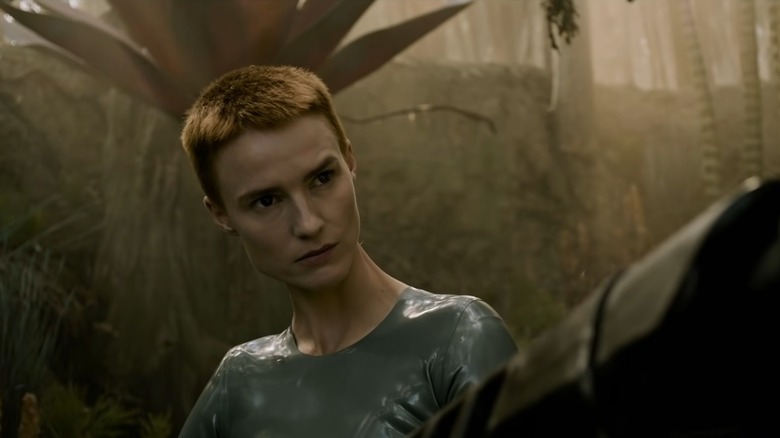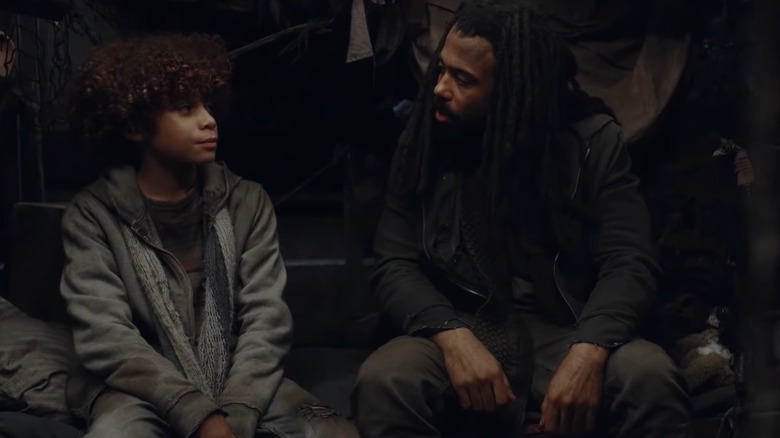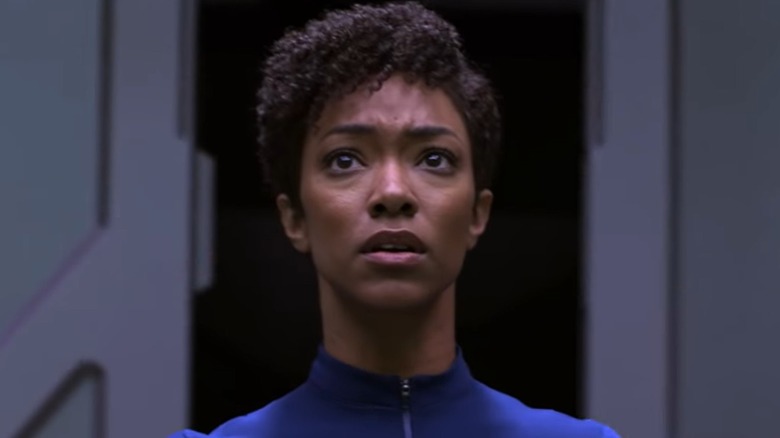Shows Like Foundation That Sci-Fi Fans Need To Watch
With its clever scripts, top-notch acting, and plenty of ideas to ponder, "Foundation" has delighted fans of heady science fiction. The Apple TV+ show takes place in a futuristic world where the Galactic Empire is on the verge of collapsing, which will lead to a devastating Dark Age ... unless our heroes can archive all of humanity's knowledge. As a result, we're treated to a tale of murder, betrayal, multiple timelines, and clones. And all the while, the show compels viewers to keep tuning in with its deep philosophical questions and spectacular visions of the future.
But if you're all caught up on "Foundation" and hungry for more, there are several science fiction series that offer big questions, intriguing answers, excellent action, and unforgettable characters. If you're looking to plunge into worlds covered in ice or want to boldly go where no one has gone before, these are the shows like "Foundation" that sci-fi fans definitely need to watch.
The 100
Like "Foundation," "The 100" is a series with the end in mind. In this case, the proverbial apocalypse has already befallen humanity. Almost 100 years after a massive conflict obliterated most of Earth — and killed most of humanity as well — the time has come to return to the planet. But, unfortunately, the Ark, a space station that allowed humanity to survive and grow again for three generations, is starting to fail. If Earth can't support life again, this may be the true finale for humankind.
The solution is the titular 100, criminals in their mid- to late teens. They're sent down to the surface to find a way for humankind to return, encountering those who stayed behind — the Grounders, the Reapers, and the Mountain Men. As the series progresses, the 100 find themselves increasingly pulled into the intergroup conflicts of the surface and facing a second nuclear apocalypse.
Viewers of "Foundation" who appreciate how human interactions and emotions, for better and worse, can bring unpredictability to even the most inevitable of events will respond to how "The 100" recognizes and plays with that theme.
Altered Carbon
For the rich and powerful (or the particularly ruthless and criminal) in "Altered Carbon," death isn't so much a fact as an inconvenience. Like the "Foundation" Emperors, new technology has ensured that one need not give up their power or station just because of the inevitable march of time or horror of disease. However, in "Carbon," the possible immortality is more literal and considerably more chaotic, involving the physical transfer of memories, personality, and possibly the soul as bits of data to an entirely new body.
Tak Kovacs (Joel Kinnaman in Season 1, Anthony Mackie in Season 2, and several other brief performances) has become familiar with this existence. He awakens 250 years after the group of rebels he allied with ended up utterly routed by those in power. The extremely wealthy Laurens Bancroft (James Purefoy) — precisely the kind of man Kovacs fought against — has pulled our protagonist's data to request that Kovacs help find a killer. Intriguingly, the victim of the crime is Bancroft himself, in a previous body.
The newly awakened revolutionary goes along with it, only to discover the already complicated crime has several more complexities. Furthering the sense of being unable to trust anything is Kovacs' increasing sense that his lover and leader of the revolution, Quell (Renée Elise Goldsberry), has somehow managed to survive 250 years into the future as well.
Battlestar Galactica
"Battlestar Galactica" is arguably the best sci-fi series of the past 20 years. Any fans of "Foundation," or science fiction in general, who haven't seen this landmark show owe it to themselves to get on that immediately.
In "Galactica," humanity has been reduced to racing into space, trying to escape extermination at the hands of the robotic Cylons. Animating the survivors — who are led and protected the titular warship — is the hope that they'll find a place to survive, the 13th Colony, better known as Earth. But as they struggle to reach that promised land, characters find themselves challenged by choices that often pit their morality against their survival.
The evolving relationship of the pursued humans and their pursuing Cylons compels viewers to question their own assumptions as well. Alliances shift and transform with characters changing sides and beliefs, and time and again, "Galactica" explores what persuades people to do the right thing or side against their own best interests. Of course, the absolute acting clinic put on by Edward James Olmos, Mary McDonnell, and James Callis certainly never hurts.
Blade Runner: Black Lotus
As in the source material, the replicants of "Blade Runner: Black Lotus" were once people's hope for the future. They could work harder and longer, protect human life, and ensure that humanity spread far and wide, gaining knowledge along the way. However, it all went awry, and soon after, the Blade Runners — a group of people devoted to hunting down and eliminating rogue replicants — were formed to protect humanity from their own creation.
Over a decade after the events of Ridley Scott's original film and 17 years before the sequel, a woman named Elle wakes up. She's devoid of memories, and only a black lotus tattoo on her shoulder and an encrypted device give any indication of her possible identity. But as hints of memories begin to surface, Elle must contend with questions of her own humanity or possible lack thereof. Additionally, the more she can recall, the more it seems likely she encountered a massive conspiracy before her memory loss.
"Black Lotus" suggests a future where no one seeks a grand gesture to protect human progress, like the one in "Foundation." Instead, it presents a world where the apocalypse came and went, with people deciding to mostly just keep on living as they had, ignoring the destruction of their world.
The Expanse
If "Battlestar Galactica" is the best sci-fi show of the past 20 years, "The Expanse" is likely the best contemporary sci-fi show, with the series ending in 2022. And with such stiff competition, that's high praise indeed.
As for the plot, years into the future, the human race has populated the solar system. Three main factions act as superpowers in this new universe order — the United Nations of Earth and Luna, the Martian Congressional Republic on Mars, and the Outer Planets Alliance (OPA). There is peace, but it's a fragile one ... and it's a peace that only grows more fragile as the series continues.
While "The Expanse" has big ideas on the brain, it tends to filter those ideas through people's actions. The series does take us into the halls of power with Chrisjen Avasarala (Shohreh Aghdashloo). However, it's equally interested in the investigations of Detective Joe Miller (Thomas Jane) or the lives of Belters, blue-collar workers who earn a living mining the asteroid belt. Moreover, the series does an excellent job teasing out how all these people — deemed with various levels of importance by society — and their actions connect to more significant events.
Farscape
While significantly more adventure-based and lighter fare than "Foundation," "Farscape" shares that series' interest in sociology and how interacting with one another can change ourselves, others, and the future.
John Crichton's (Ben Browder) greatest success has ruined his life. Sucked through a black hole and tossed into an unknown place — and possibly time — Crichton finds himself aboard the Moya. This living spaceship is mid-desperate escape from the Orwellian-named "Peacekeepers," a brutal, corrupt organization taken to dominating their section of the Milky Way.
Those aboard the Moya have no common mission except to find their own respective ways home. Alas, their escape and Crichton's unfortunately timed arrival have made them the intense focus of the Peacekeepers. Stuck with one another until they can shake their pursuers, the misfits of the Moya begin to see past their differences and connect. Death, trauma, and destruction test their bonds repeatedly throughout the show's four seasons and concluding miniseries. However, these tragedies serve to reinforce the central message of "Farscape" — that committing to one another and to the idea of some kind of better tomorrow is the only way to move through life.
Lost in Space
"Lost in Space," while a darker and grittier interpretation of the original TV series, shares an optimism about science with "Foundation." The series is frequently animated by the sense that no matter the problem, there can be a solution reached through scientific ingenuity. This doesn't just mean a blown gasket or damaged hull either. Encounters with other beings, interactions within the family, and dealing with Dr. Smith (Parker Posey) all carry an air of possibility in them. Even if the solution is not readily apparent to improving that ship or that person, it does exist.
As in the original series, "Space" focuses predominantly on the exploits of the Robinson family, the robot inexplicably drawn to youngest child, Will (Maxwell Jenkins), and their amoral stowaway, Dr. Smith. Unlike its predecessor though, this incarnation has a much more focused trajectory. The sense of questing for a way home remains, certainly. However, the show adds complexity with a rising conflict between the Robots — like Will's "friend" — and humanity. As with other hopeful science fiction, "Lost in Space" focuses heavily on the role empathy can play in saving oneself and others, a question that features heavily in the show's final climactic battle.
Raised by Wolves
If "Foundation" asks what if we left our future society up to a new scientific discipline and a vast repository of all our knowledge, then "Raised by Wolves" asks what if we let our future society up to androids? When the end drew close, humanity reached for a solution in both shows. In "Wolves," they just decided on androids instead.
The charge of those androids, known as Mother (Amanda Collin) and Father (Abubakar Salim), is the protection and raising of what they believe to be the last human embryos in existence. Unfortunately, their mission goes awry almost immediately, leading to the destruction of all but one. However, soon after, they discover their beliefs about humanity's dire situation may have been a bit uninformed.
The improved prognosis for humanity's survival brings with it increased conflict though. Before, Mother and Father had only themselves to rely on and their charges to protect. Now, they face a need to negotiate, convince, and evaluate who deserves trust and who does not. Humanity's chances of surviving may have increased, but the complexity of what survival may mean has risen steeply as well.
Snowpiercer
Like "Foundation," "Snowpiercer" is a lesson in the danger of the unintended consequences of counting on one theoretical solution to save humanity. In this case, attempts at environmental engineering have left the Earth stuck in an endless and human-killing winter. To survive, the Snowpiercer — a high-speed, never-stopping train — carries humans around the globe forever and ever. Divided into social classes, the conditions on Snowpiercer are tenuous at best. They only grow worse as a series of murders throw the class system into disarray.
It doesn't get any better with the arrival of Snowpiercer's creator, Mr. Wilford (Sean Bean), on another train. Left behind by Melanie Cavill (Jennifer Connelly) for increased signs of being a megalomaniac, Wilford seeks to return to the brutal caste system, undoing all of Andre Layton's (Daveed Diggs) efforts to find a more equitable system.
The bookend apocalypses of the endless winter and Mr. Wilford's authoritarianism provide a possible warning to the choices in "Foundation." It suggests the dangers of catch-all solutions like Seldon's (Jared Harris) knowledge archive and Seldon himself. Magic bullets and charismatic leaders often prove to be more dangerous than the problems they seek to resolve.
Star Trek: Discovery
It's impossible to talk sci-fi television without evoking the godfather of it all, "Star Trek." While the franchise offers several worthy choices for selection here, "Star Trek: Discovery" makes the most sense.
To begin with, the concerns of "Discovery" have come about primarily because of the actions of Commander Michael Burnham (Sonequa Martin-Green). Her overconfidence has led directly to a long and brutal war. In a way, she mirrors both the Emperor clones and Seldon as people so confident in themselves — they press on without looking for others' input.
However, The war doesn't permanently destroy the universe. Thus, "Discovery" is also a series equally concerned with rebuilding from the ashes. In other words, the show not only maintains the signature optimism of "Star Trek" but ups its importance. In a galaxy where things run relatively smoothly most of the time, optimism is easy. In a galaxy recovering from years of destruction and bloodshed, believing in a better tomorrow is heroic.
